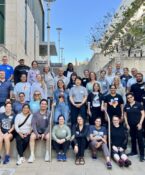Wash up! It’s handwashing week
It is that time of year again. It seems everyone around you is sick, sneezing or coughing. What is a great way to avoid getting sick yourself? It is no coincidence that December 2-8 is National Hand Washing Week. Why is hand washing so important? Eighty percent of all infectious diseases are transmitted by touch.
According to the Centers for Disease Control, “the most important thing you can do to keep from getting sick is to wash your hands.” Judicious hand washing can prevent not only common diseases like colds, but also more serious diseases like hepatitis A, meningitis, and infectious diarrhea.
“National Hand Washing Week is a great opportunity to promote prevention,” said Jan Jowitt, RN, DHA, Director of Nursing Services and Infection Control Officer for UNT Health. “Good hand hygiene is one of the most important techniques of illness prevention.”
Six Main Rules of Hand Washing
- Always wash your hands after using the bathroom, changing diapers, cleaning up after your pets, or handling money.
- Wash your hands when they’re dirty.
- Always wash your hands before eating.
- Don’t cough or sneeze into your hands.
- Refrain from putting your fingers in your eyes, nose, or mouth.
- Avoid touching people and surfaces with unclean hands.
Correct way of washing hands
- Wet hands with warm water (not hot) and use soap.
- Rub your hands together, making sure to scrub all areas.
- Rub for a minimum of 15 seconds or sing “Happy Birthday.”
- Rinse thoroughly, then dry hands on a clean towel.
- Turn faucet off with the towel, not hands, to keep away from recontamination.
Statistics
- Only 2/3 of adults in the U.S. wash hands after using the bathroom
- 1 in 4 adults don’t wash hands after changing diapers
- Less than 1/2 of Americans wash hands after cleaning up after pets
- Only 1 in 3 wash hands after sneezing/coughing
- Less than 1 in 5 wash hands after touching money
- 1 in 3 E.coli occurrences is caused from not washing hands before handling food
By frequently washing your hands, you wash away germs that you have picked up from other people, surfaces, or from animals and animal waste. The simple act of consistently performing this basic task properly will make a big difference in your own household as well as in work, school and public settings.





Social media